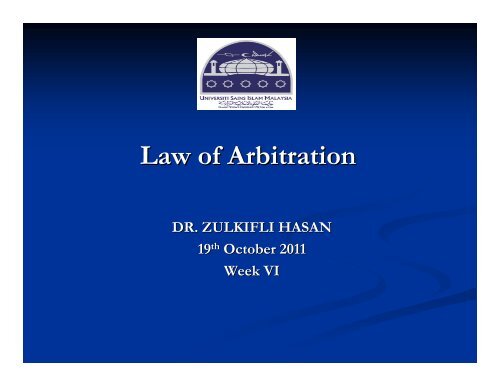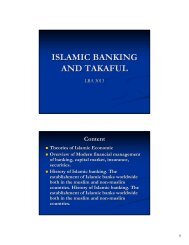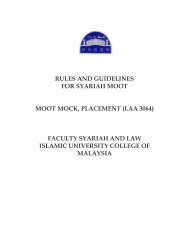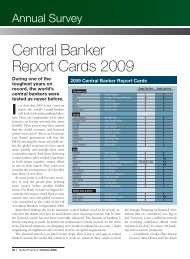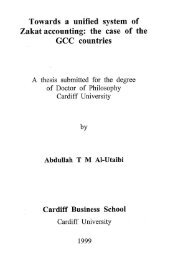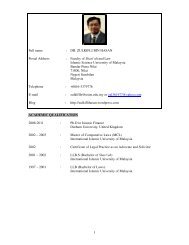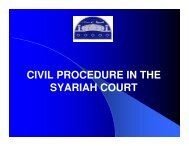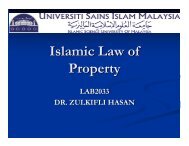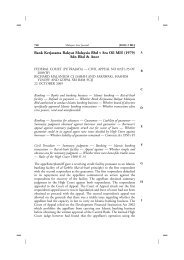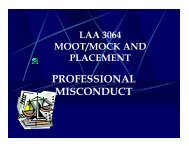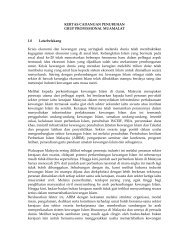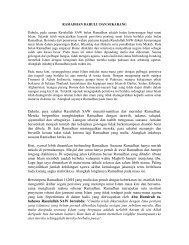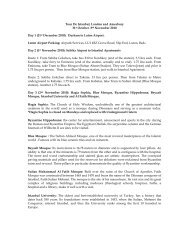Proceedings of Arbitration
Proceedings of Arbitration
Proceedings of Arbitration
You also want an ePaper? Increase the reach of your titles
YUMPU automatically turns print PDFs into web optimized ePapers that Google loves.
Law <strong>of</strong> <strong>Arbitration</strong><br />
DR. ZULKIFLI HASAN<br />
19 th October 2011<br />
Week VI
CONTENTS<br />
Commencement<br />
Appointment <strong>of</strong> Arbitrators<br />
Qualifications<br />
Duties
<strong>Proceedings</strong><br />
i. Appointment <strong>of</strong> arbitrator<br />
(S.13)<br />
- parties appoint an arbitrator (mutual<br />
consent / own choice)<br />
- arbitrator accept the appointment<br />
- qualifications in accordance with arb.<br />
Agreement (if fails to meet the<br />
requirements he should excuse himself)<br />
ii.<br />
Preliminary meeting<br />
- procedures, dates <strong>of</strong> hearing, inspection<br />
<strong>of</strong> relevant papers, documents, etc<br />
- dates <strong>of</strong> hearing (S.26 )
iii.<br />
Principles <strong>of</strong> natural justice (S.20)<br />
- fair (should not hear one party only)<br />
- should not communicate with either party w/out<br />
the knowledge <strong>of</strong> the other party<br />
- maintain the privacy and confidentiality <strong>of</strong> the<br />
proceeding (but must not exclude persons invited<br />
to assist a party in presenting its case)<br />
iv. Procedure (S. 21,22,24)<br />
- as provided in the arbitration agreement<br />
v. Submission (S.25,27)<br />
- parties prepare submission
vi.<br />
vii.<br />
Closing a case<br />
- inform parties <strong>of</strong> his intention to<br />
close the case<br />
Seeking legal advice (S.28)<br />
- with the consent <strong>of</strong> the parties<br />
viii. Evidence (S.29)<br />
- award shall be based on the<br />
evidence
Commencement<br />
The first formal step<br />
Correct procedural steps, The date must be ascertained<br />
If there is condition precedent, the parties must fulfill<br />
the CP before they may commence the arbitration<br />
In accordance with specific arbitration rules or an<br />
agreed procedure<br />
Normally by request or notice or application or<br />
statement <strong>of</strong> claim<br />
(i) Making claim or the serving <strong>of</strong> a request for<br />
arbitration or the appointment <strong>of</strong> arbitrator-<br />
(ii) Filing a notice with the institutional arbitration.
Commencement Date<br />
Absence <strong>of</strong> commencement date: date to request<br />
dispute to be referred to arbitration.<br />
Request Notice:- To appoint an arbitrator or to<br />
submit dispute to institutional arbitration.<br />
The arbitration is deemed to have commenced<br />
when one party to the AA serves on the other<br />
parties a notice requiring the other to submit the<br />
dispute to the arbitrators.<br />
S6 <strong>of</strong> AA2005.
Time Limitation<br />
If the terms <strong>of</strong> AA provide for reference <strong>of</strong> a<br />
dispute to arbitration within specified time<br />
period, then such dispute must be commenced<br />
within the time time prescribed.<br />
Parties are free to vary the limitation period.
Consequence <strong>of</strong> the Expiry <strong>of</strong> a<br />
Contractual Limitation<br />
May provide a defence<br />
May bar a claimant’s s right to bring a claim or<br />
may extinguish it
Sample <strong>of</strong> AA<br />
“ All differences arising out <strong>of</strong> this<br />
policy should be referred to<br />
arbitration. If the company should<br />
disclaim liability to the insured for<br />
any claim and such claim was not<br />
referred to arbitration within 12<br />
calendar months from the date <strong>of</strong><br />
such disclaimer, then the claim should<br />
for all purposes be deemed to have<br />
been abandoned ….”
Extension <strong>of</strong> time<br />
The consequence <strong>of</strong> the expiry <strong>of</strong> a contractual<br />
limitation period may be avoided if: -<br />
1. Court’s s discretion: Undue hardship<br />
2. arbitration clause confers discretion on the<br />
arbitrator<br />
3. if the conduct <strong>of</strong> the other party precludes his<br />
relying on the time bar against the claimant.<br />
S45 AA 2005: High Court has the power to extend the<br />
time which has expired if it is in the opinion that<br />
undue hardship would otherwise be caused and also<br />
depending on the circumstances <strong>of</strong> the case.<br />
The claimant must take all reasonable steps to get his<br />
application for an extension before the Ct as soon as<br />
possible and cannot deliberately delay.
What amounts to undue hardship<br />
It would not be considered undue hardship<br />
where one party tries to commence arbitration<br />
after the lapse <strong>of</strong> time due to his own fault.<br />
Greater hardship than the circumstances<br />
warrant.<br />
If the result <strong>of</strong> claimants being perhaps a<br />
day late is so oppressive, so burdensome and<br />
out <strong>of</strong> proportion to the fault.
Phoenix Shipping pty v General Feeds<br />
Inc [1997] 2 Lloyd’s s Rep 703<br />
Allowed extension <strong>of</strong> 23 months.<br />
The delay was caused by<br />
unexplained failure <strong>of</strong> the<br />
claimant’s s solicitor’s s system <strong>of</strong><br />
time bar logging and<br />
misunderstanding within the<br />
<strong>of</strong>fice.
Pegasus v. A. King & Sons Ltd<br />
[1967] 1 All ER 934<br />
Undue hardship means<br />
excessive. It means greater<br />
hardship than the circumstances<br />
warrant.<br />
Excusable mistake<br />
Disproportionate loss likely to be<br />
suffered by the claimant<br />
Mistake shared by or contributed<br />
to by the other party
The Jocelyne [1977]<br />
2 Lyod’s Rep 121<br />
Undue hardship can be<br />
summarised as follows:<br />
Undue hardship should not be<br />
construed too narrowly<br />
1) It means excessive hardship.<br />
2) In deciding whether to extend<br />
time or not, the Court will look<br />
at all relevant circumstances <strong>of</strong><br />
a particular case. The following<br />
matter should be considered:
i) Length <strong>of</strong> delay<br />
ii)<br />
Amount at stake<br />
iii)<br />
Whether the delay was due to the<br />
fault <strong>of</strong> the claimant/circumstances<br />
outside his control<br />
iv)<br />
If it is due to the fault <strong>of</strong> the<br />
claimant, the degree <strong>of</strong> such fault<br />
v) Whether the claimant was misled by<br />
the other party<br />
vi)<br />
Whether the other party has been<br />
prejudiced by the delay – degree <strong>of</strong><br />
that prejudice
Other cases<br />
Safety Insurance Company Sdn Bhd v. Chow<br />
Soon Tat [1975] 1 MLJ 193<br />
‘Inordinate delay on the part <strong>of</strong> the<br />
respondent in making application for<br />
extension <strong>of</strong> time is not the only factor to be<br />
considered.’<br />
Labuan Wood Product [1991] 2 CLJ 1004<br />
The interest <strong>of</strong> justice requires that the P be<br />
given extension <strong>of</strong> time and to refuse it<br />
would cause undue hardship to the P.
Requirement<br />
It has to be made promptly<br />
Raymond & Reid v. Granger<br />
A delay more than three months<br />
after the breakdown <strong>of</strong><br />
negotiations for arbitration,<br />
w/out explanation for this delay<br />
prompted the court to refuse<br />
extension.
Factors for Extension <strong>of</strong> Time<br />
1) Degree <strong>of</strong> blameworthiness <strong>of</strong> the<br />
party claiming under arbitration to<br />
appoint an arbitrator w/out delay<br />
2) Amount involved in the arbitration<br />
3) Extent <strong>of</strong> the delay<br />
4) The fact that the claimant has been<br />
misled<br />
5) Due to circumstances beyond their<br />
control, parties failed to appoint an<br />
arbitrator within the prescribed time<br />
in the agreement
Ouster Clause<br />
Parties to a contract cannot oust<br />
the jurisdiction <strong>of</strong> the court by<br />
providing so in the agreement<br />
Implication: Illegal, void,<br />
contrary to public policy<br />
S.41 <strong>of</strong> <strong>Arbitration</strong> Act 2005 – ref<br />
to HC for issues on questions <strong>of</strong><br />
law
Scott v Avery Clause<br />
A contract between two parties that they will<br />
submit any dispute between them to arbitration<br />
before taking any court action.<br />
This clause makes arbitration a condition<br />
precedent to any court action.
Scott v. Avery(1856) 10 ER 1121<br />
“No person can oust the jurisdiction<br />
<strong>of</strong> the court, however it may be valid<br />
for the parties to provide that no<br />
action shall start until the disputed<br />
matters are put into arbitration.”<br />
If there is Scott v. Avery clause, it has<br />
been held as a valid ground for stay<br />
<strong>of</strong> court action.<br />
Such a clause will be a defence to any<br />
action brought before a court.
WHETHER COURT HAS POWER TO<br />
IGNORE SCOTT V. AVERY CLAUSE<br />
Scott v. Avery Clause may be over<br />
ridden by the court based on the<br />
following reasons:<br />
i) Authority <strong>of</strong> arbitrator is revoked<br />
ii)<br />
Where the court removes the<br />
arbitrator<br />
iii)<br />
Where the parties themselves<br />
waived it<br />
iv)<br />
Where the disputes is outside the<br />
jurisdiction <strong>of</strong> arbitrator
Appointment <strong>of</strong> Arbitrators<br />
Why To resolve dispute i. pr<strong>of</strong>iciently, ii.<br />
economically iii. Expeditiously than the court<br />
Arbitrators may have been identified prior to the<br />
AA or to be nominated once a dispute has<br />
arisen.<br />
The nature <strong>of</strong> rship btn arbitrators and parties is<br />
contractual
Procedure<br />
The parties may name the arbitrator in the AA, May<br />
name the sole arbitrator, May agree to refer dispute to<br />
Institutional <strong>Arbitration</strong>.<br />
The parties may have to contact the arbitrators and to<br />
get their consent.<br />
The arbitrators then give consent and set out the basis<br />
on which he is prepared to accept the appointment.<br />
In practice:- the claimant to submit to the respondent a<br />
name or list <strong>of</strong> arbitrators indicating their experiences,<br />
qualifications. If the respondents agrees, the parties will<br />
send a written invitation to accept the reference.
Appointment By Parties<br />
• The parties to an arbitration agreement may<br />
appoint the arbitrators.<br />
• They are: -<br />
free to choose any number <strong>of</strong> arbitrators<br />
S 13 (2)- Appointment <strong>of</strong> arbitrators need not<br />
be in a particular form<br />
<strong>Arbitration</strong> agreement may contain the name<br />
<strong>of</strong> arbitrators, rules for selecting arbitrators,<br />
number <strong>of</strong><br />
S 12- Number <strong>of</strong> Arbitrators (S.12)<br />
S 13- Method <strong>of</strong> selection <strong>of</strong> arbitrators
Appointment by Third Party<br />
a neutral third party<br />
Director <strong>of</strong> KLRCA (S.13(4), S.13(5),<br />
S.13(6) )<br />
S.13(8) – Dir KLRCA shall have due<br />
regard to :<br />
1)Qualifications<br />
2)Other considerations that are likely to<br />
secure the appointment <strong>of</strong><br />
independent and impartial arbitrator<br />
3)International arbitration –<br />
advisability <strong>of</strong> appointing an<br />
arbitrator <strong>of</strong> a nationality other than<br />
those <strong>of</strong> the parties
Appointment by the HC<br />
S.13(7) – where the Director <strong>of</strong><br />
KLRCA is unable to act/fails to<br />
act under subsections (4), (5)<br />
and (6), any party may apply<br />
from the High Court for such<br />
appointment.
SOLE ARBITRATOR<br />
S 13(5)<br />
Either party may apply to the Dir KLRCA<br />
for the appointment <strong>of</strong> an arbitrator<br />
where<br />
(a)Parties fail to agree on the procedure<br />
(S.13(2)) and<br />
(b) Parties fail to agree on the arbitrator
THIRD ARBITRATOR<br />
S.13( 3)<br />
- If parties fails to agree in the<br />
procedure<br />
- Each party shall appoint 1 arbitrator<br />
- The two appointed arbitrators shall<br />
appoint third arbitrator as the<br />
presiding arbitrator
QUALIFICATIONS OF AN<br />
ARBITRATOR<br />
Can be <strong>of</strong> any nationality and need not be<br />
legally trained<br />
No specific requirement under the AA 2005.<br />
parties are free to choose an arbitrator, who<br />
is competent to act and does not suffer from<br />
any disability.<br />
disabilities may include lunacy or physical<br />
disabilities.<br />
persons who have special qualifications<br />
may be appointed<br />
Eg: : judge, advocates and solicitors, retired<br />
government <strong>of</strong>ficers, chartered accountants.
Duties <strong>of</strong> An Arbitrator<br />
i) Uphold the principle <strong>of</strong> natural<br />
justice<br />
Ii) He should decide only disputes<br />
submitted to him<br />
iii) He should comply with the terms<br />
<strong>of</strong> submission.<br />
Iv) He should decide according to law
Principles <strong>of</strong> natural justice<br />
• S.20:<br />
Fairly<br />
should not favour one party over<br />
the other.<br />
must not hear one party to the<br />
dispute or witness in the absence <strong>of</strong><br />
another, except in such few cases<br />
where it is so provided.<br />
he must not receive information<br />
from one side which was not<br />
disclosed to the other party.
Principles <strong>of</strong> natural justice<br />
Judiciously<br />
must observe the fundamental rules which<br />
govern proceedings.<br />
must follow the rules <strong>of</strong> administration <strong>of</strong><br />
justice- misconduct/breach <strong>of</strong> his duty.<br />
Turner v. Builders Federal [1988] 2 MLJ 502<br />
“…an arbitrator must always act judicially<br />
with a detached mind and with patience. He<br />
must not take an adversarial role and his<br />
response must be always measured and<br />
circumspect”
Comply with the terms <strong>of</strong><br />
submission<br />
He should comply with the terms <strong>of</strong><br />
submission.<br />
Where the submission states his<br />
power and duties, he should abide by<br />
them.<br />
eg: : Inspection <strong>of</strong> certain premise within<br />
a certain period <strong>of</strong> time
According to law<br />
He should decide according to law,<br />
and not solely on what he considers<br />
fairs and reasonable under<br />
circumstances


